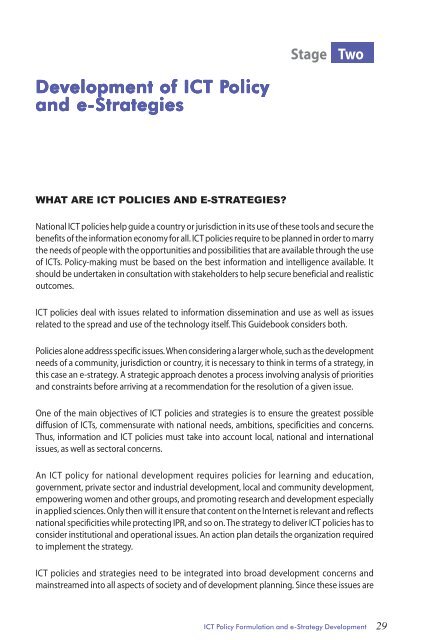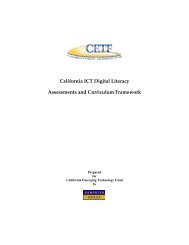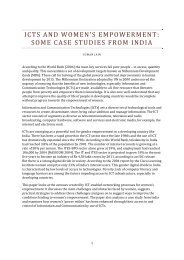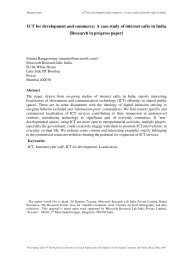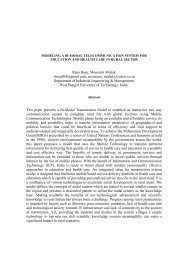ICT Policy Formulation and e-Strategy Development: A ... - un-apcict
ICT Policy Formulation and e-Strategy Development: A ... - un-apcict
ICT Policy Formulation and e-Strategy Development: A ... - un-apcict
Create successful ePaper yourself
Turn your PDF publications into a flip-book with our unique Google optimized e-Paper software.
Stage Two<br />
<strong>Development</strong> of <strong>ICT</strong> <strong>Policy</strong><br />
<strong>and</strong> e-Strategies<br />
WHAT ARE <strong>ICT</strong> POLICIES AND E-STRATEGIES?<br />
National <strong>ICT</strong> policies help guide a co<strong>un</strong>try or jurisdiction in its use of these tools <strong>and</strong> secure the<br />
benefits of the information economy for all. <strong>ICT</strong> policies require to be planned in order to marry<br />
the needs of people with the opport<strong>un</strong>ities <strong>and</strong> possibilities that are available through the use<br />
of <strong>ICT</strong>s. <strong>Policy</strong>-making must be based on the best information <strong>and</strong> intelligence available. It<br />
should be <strong>un</strong>dertaken in consultation with stakeholders to help secure beneficial <strong>and</strong> realistic<br />
outcomes.<br />
<strong>ICT</strong> policies deal with issues related to information dissemination <strong>and</strong> use as well as issues<br />
related to the spread <strong>and</strong> use of the technology itself. This Guidebook considers both.<br />
Policies alone address specific issues. When considering a larger whole, such as the development<br />
needs of a comm<strong>un</strong>ity, jurisdiction or co<strong>un</strong>try, it is necessary to think in terms of a strategy, in<br />
this case an e-strategy. A strategic approach denotes a process involving analysis of priorities<br />
<strong>and</strong> constraints before arriving at a recommendation for the resolution of a given issue.<br />
One of the main objectives of <strong>ICT</strong> policies <strong>and</strong> strategies is to ensure the greatest possible<br />
diffusion of <strong>ICT</strong>s, commensurate with national needs, ambitions, specificities <strong>and</strong> concerns.<br />
Thus, information <strong>and</strong> <strong>ICT</strong> policies must take into acco<strong>un</strong>t local, national <strong>and</strong> international<br />
issues, as well as sectoral concerns.<br />
An <strong>ICT</strong> policy for national development requires policies for learning <strong>and</strong> education,<br />
government, private sector <strong>and</strong> industrial development, local <strong>and</strong> comm<strong>un</strong>ity development,<br />
empowering women <strong>and</strong> other groups, <strong>and</strong> promoting research <strong>and</strong> development especially<br />
in applied sciences. Only then will it ensure that content on the Internet is relevant <strong>and</strong> reflects<br />
national specificities while protecting IPR, <strong>and</strong> so on. The strategy to deliver <strong>ICT</strong> policies has to<br />
consider institutional <strong>and</strong> operational issues. An action plan details the organization required<br />
to implement the strategy.<br />
<strong>ICT</strong> policies <strong>and</strong> strategies need to be integrated into broad development concerns <strong>and</strong><br />
mainstreamed into all aspects of society <strong>and</strong> of development planning. Since these issues are<br />
<strong>ICT</strong> <strong>Policy</strong> <strong>Formulation</strong> <strong>and</strong> e-<strong>Strategy</strong> <strong>Development</strong><br />
29


